‘If I had my time over, I’d take that rainbow jersey in a heartbeat!’ The words of Mick Bennett when he casts his mind back to that day in August 1973 in San Sebastian when the West German team crashed in the final of the world team pursuit championship and failed to finish with three riders as the rules dictate, leaving the Great Britain quartet as world champions.
The Germans protested on the grounds that they’d been leading when the crash occurred, GB did not contest the protest; had they done so they would have been world champions.
Rik Evans, who was in that GB squad and who we interviewed recently thinks the decision was the right one; Bennett doesn’t.
But let’s go back to the beginning of Bennett’s career, which continues to this day in major bike race organisation, including the Tour of Britain and Tour de Langkawi.
Is it true that your inspiration to race came from Graham Webb, who’s sadly no longer with us but who beat the like of Roger De Vlaeminck to win the world amateur road race championship in 1967?
“Yes, we both lived in the Sparkbrook area of Birmingham which was a pretty run-down part of the city.
“As a youth I had Osgood Schlatter disease which affects your legs and spent months in full length leg plaster casts.
“After the casts came off the hospital physiotherapist said that cycling would be the best exercise to build my legs back up.
“He put me on a Puch Tunturi stationary exercise bike and gave me some targets to achieve – I smashed them, it was as if I’d been destined to ride a bike.
“Our next door neighbour gave me an old BSA which I used to bomb round the streets of Sparkbrook; I used to see Graham out on his bike, one day I got talking to him and went along to his clubrooms with him – that was the start.”
You’re perhaps best known for your track exploits but as far back as 1968 you were fifth in the Tour of the Cotswolds – a most ‘non trackie-friendly’ race.
“Like a lot of young British cyclists I started off in time trials then began to ride the road, I was Birmingham Division Junior and Senior Road Race Champion.
“It was the late Tommy Godwin who was a coach and organiser in Birmingham who ‘discovered’ me and suggested I ride the track.
“I didn’t have a track bike but he loaned me one.”
When I started cycling in 1970/71 I remember you and Grant Thomas being very successful on the Dutch and Belgian winter boards.
“When I was 20 or 21 years-old, Grant and I decided to seek our fortune on the continent, we loaded our bikes in to his Austin A40 and headed over there.
“We trained hard, rode the track leagues, single day events and amateur Six Days on tracks like Ghent, Antwerp and Rotterdam – we won quite a lot of races.
“After we won the amateur Six in Rotterdam Patrick Sercu and Alain Van Lancker, the French Six Day star, said that if we turned pro then they make sure we got contracts.
“But we didn’t take up the offer.”
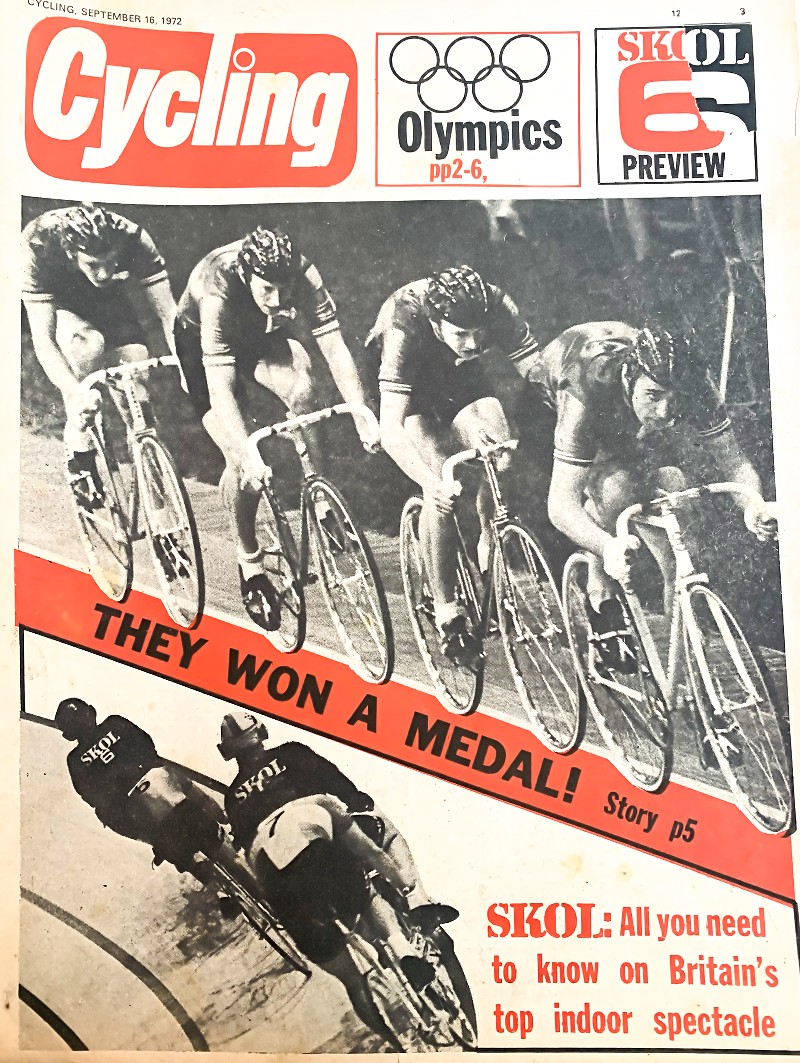
How did your team pursuit odyssey, which took you to Commonwealth, Worlds and Olympic medals, begin?
“As I said, Tommy Godwin spotted my potential and I was selected for the Commonwealth Games in Edinburgh where I rode the kilometre time trial and then the same event at the Worlds in Leicester.
“Ian Hallam, Willi Moore and Ron Keeble were known as, ‘The Big Three’ back then, I joined up with them and we decided that we were going to ‘go for it.’
“We lived together, went to bed and rose at the same time, ate together, trained together, warmed-up together – it was our form of ‘marginal gains’ to build the camaraderie that you need to have a real team.
“Bear in mind that we funded just about everything ourselves.”
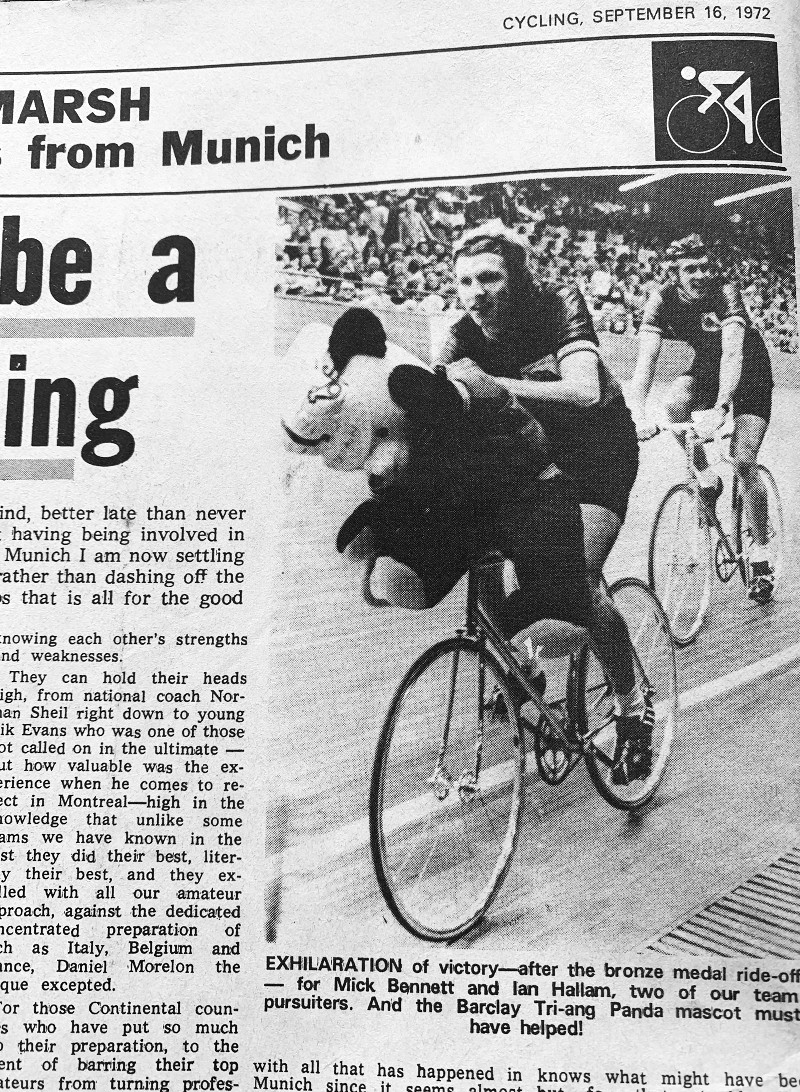
Apart from the tragedy with the Israeli athletes which unfolded at the 1972 Olympics, what are your recollections of the Munich Olympics and your bronze medals?
“The fun we had – we all had a great sense of humour and one of our wheezes was to go out with the road team and half-wheel them until we cracked them – we had been doing so much speed training that we were very fast.
“Back then you had four rides in a team pursuit series, qualifying, quarter-final, semi-final and final.
“We qualified fifth fastest then bested The Netherlands in the quarters.
“In the semis we were up against the West Germans and holding our own when Willi Moore punctured, he was in second spot behind Ian Hallam, the worst possible place and at that level it was all over.
“I remember Phil Bayton from the road team and Geoff Cooke who was there to ride in the tandem sprint with Dave Rowe gave us great support.
“Our technique was that of our four lap spells, we’d ride two at 80% then the last two at 100% – I said that I wanted Phil to give us the trackside shouts, he had a very distinctive voice which was the only one I could recognise.
“I remember him shouting; ‘bury yourself!’ as I did my last spell in the ride for bronze where we beat the Polish team with a faster time than the silver medal East German team recorded.”
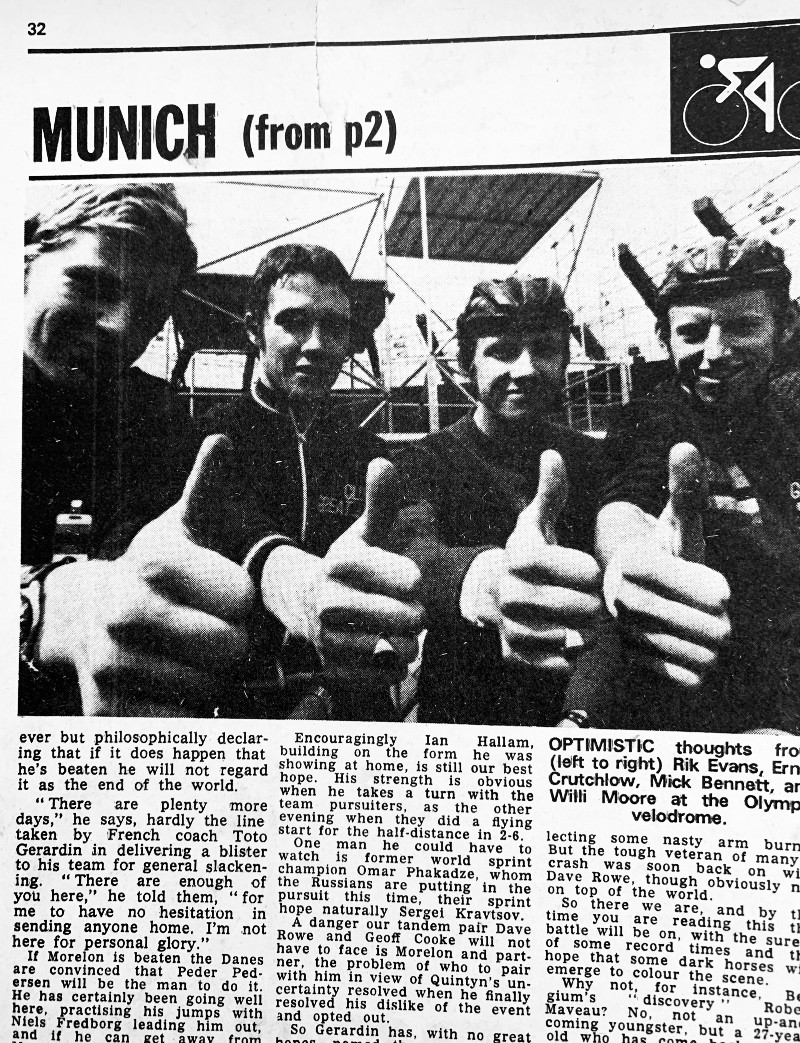
One year later, San Sebastian 1973 and you gave the rainbow jerseys away…
“I didn’t want to!
“It was largely at Norman Sheil’s persuasion that we did so, Willi and Ian also regret that we did it – it was unprecedented in British and UCI cycling history.
“I actually skiffed that same official who was re-positioning the datum sponges during our ride so it could so easily have been us that came down.
“The fact is that whatever you say, the Germans were DNF.”
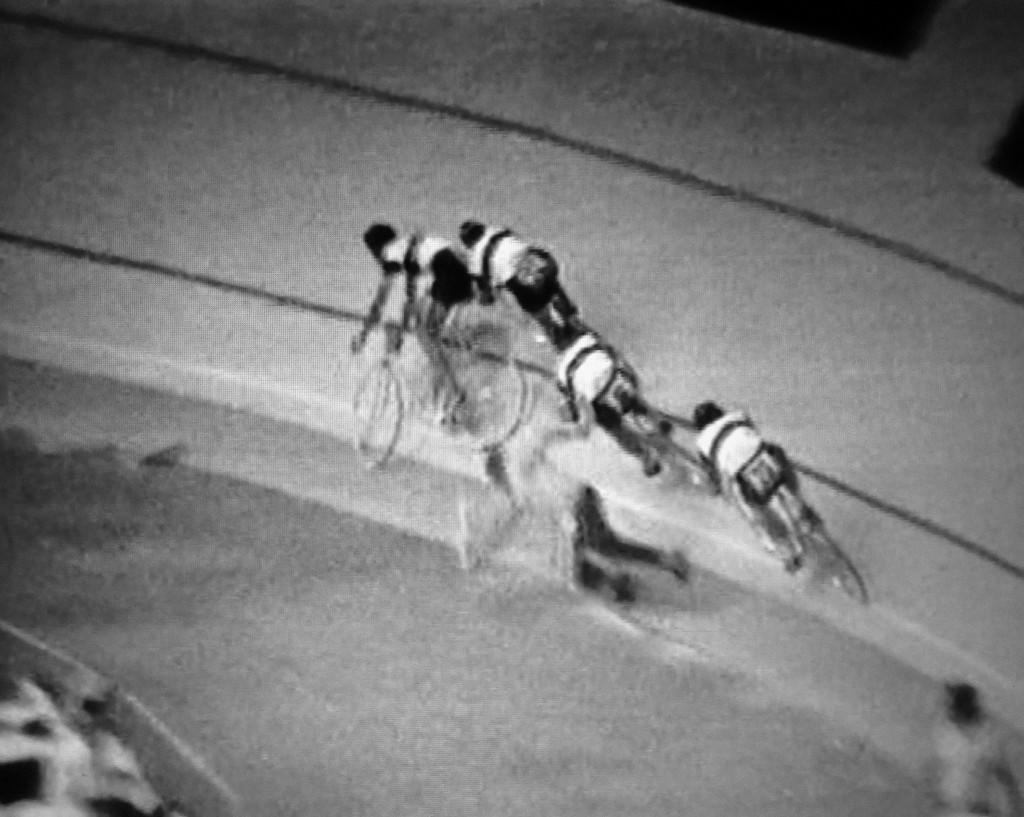
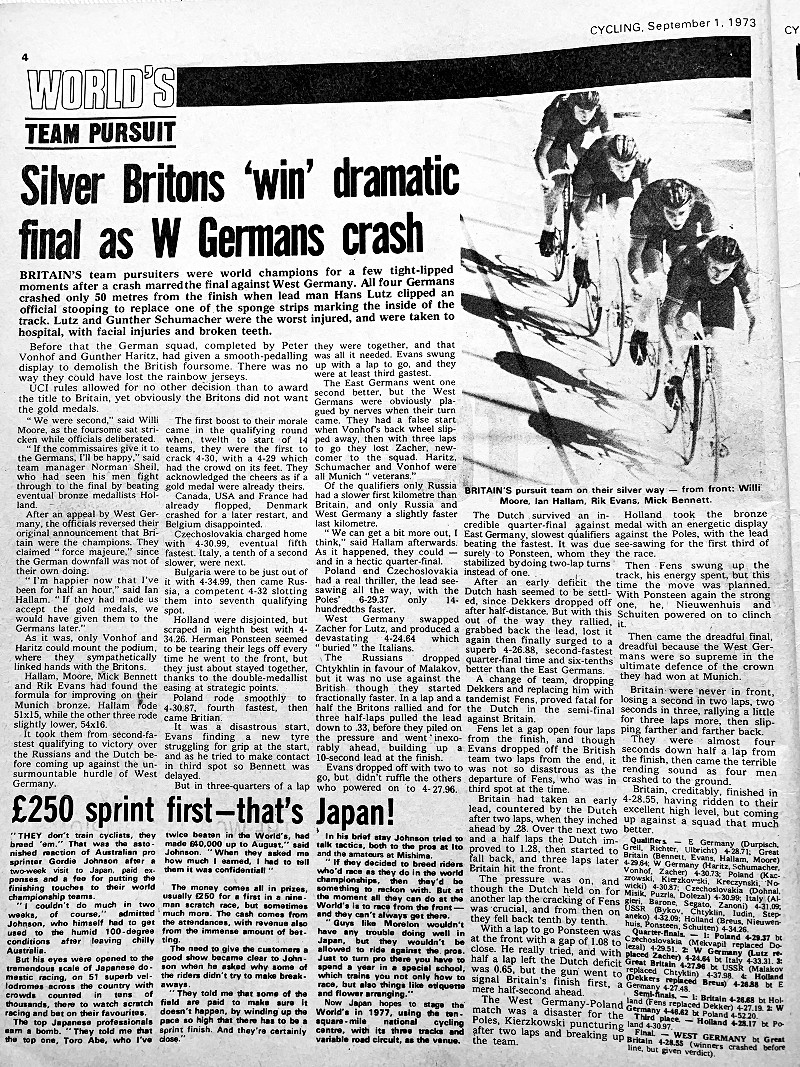
Then in the ’74 Worlds in Montreal you were on world record pace when Ian Hallam broke a spoke, punctured and crashed?
“We’d prepared by racing and training in The Netherlands and had Ruud Bakker – who went on to work with Ti-Raleigh – as our soigneur; we qualified fourth fastest, with the Russians and East and West Germans just one second faster than us.
“But in the quarters we were up against the Czechs when Ian broke a spoke, the tyre rubbed the frame, blew and he came down.
“We were on a very fast time, leading the Czechs; they went on to take bronze.
“That finished cycling for me and I flew from Montreal to Jamaica where I helped their national coach, Ted Wood coach the Jamaican riders.”
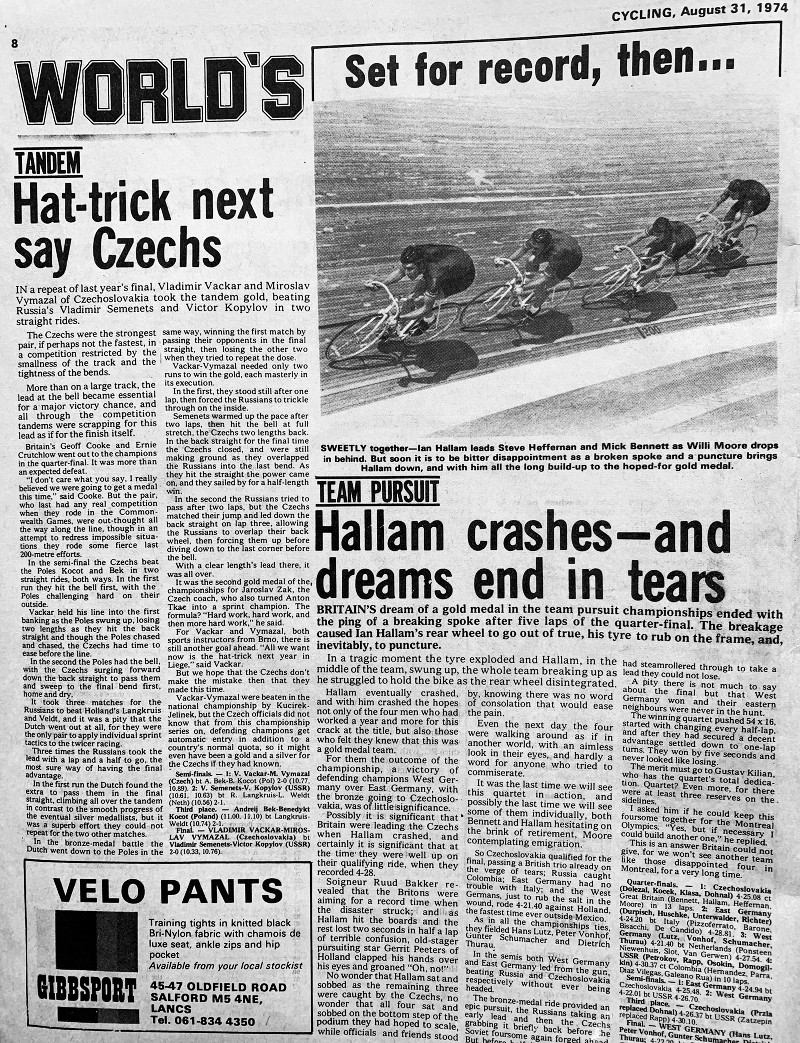
Only Rik Evans from the ‘San Sebastian four’ lined up for the ’75 Worlds?
“That year is a void in my memory, I’m afraid.”
[GB, without Bennett and Hallam, qualified eighth fastest in the team pursuit then went out in the quarters to Italy, ed.]
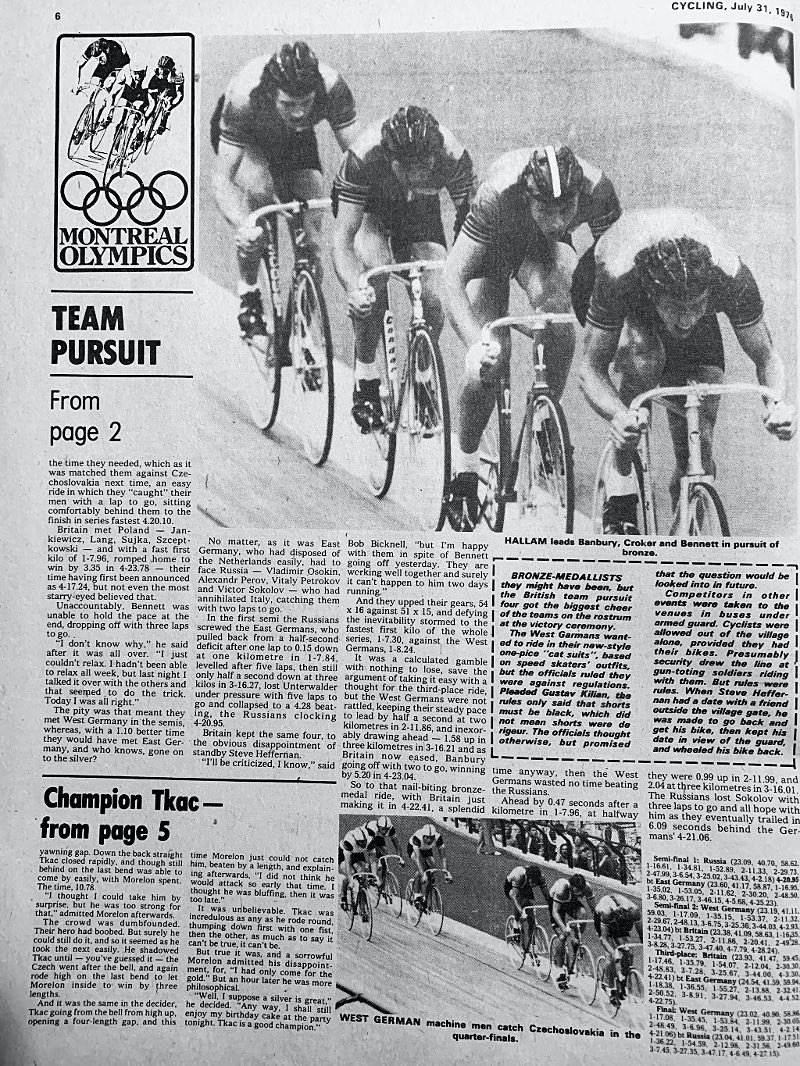
But back in ’76 for the Montreal Olympics?
“Jim Hendry said that I’d have to prove myself to get back in the team.
“I guested with the Coventry Olympic in the Zerny Two day race, I won the time trial and placed on all the other stages and was back in the team.”
And another bronze medal.
“Yes, with Ian, Rik and Robin Croker; the West Germans won with a 4:21 ride to beat the Russians 4:27 in the final, we rode 4:22 to take the bronze, beating the East Germans.”
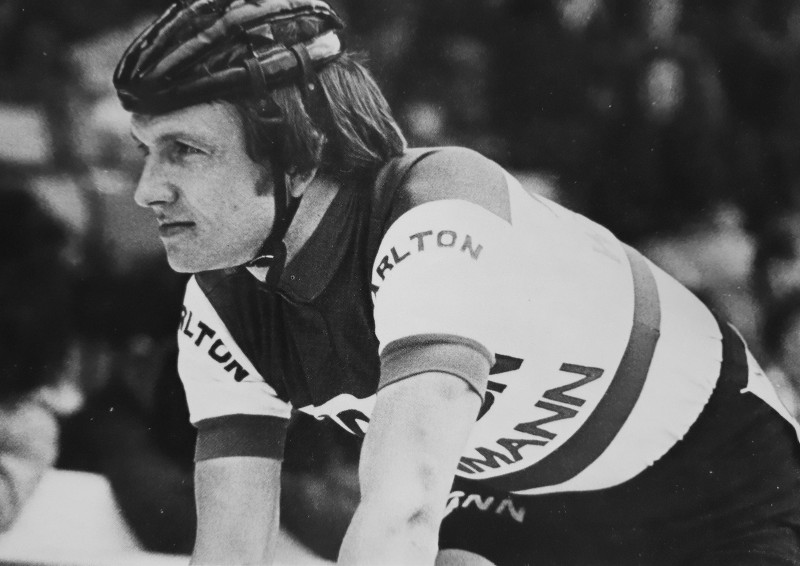
What level of support did you get from the British Cycling Federation at these events?
“It was our own equipment, we had to give our jerseys back, we rode our own tyres – we did have accommodation paid at training camps but that was about it.
“The Tommy Godwin frame I rode at the Montreal Worlds was bought second hand, I sold it after the race.”
Pro in ’77, how was the transition to the road?
“You must remember that Ian, Willi and I competed on the road regularly as a team – the Milk Race, the Tour of Scotland, Star Trophy races…
“The first year was difficult because the pros didn’t want to see a first year pro winning their races.
“But I had some great years as a pro; one year I took eight or nine wins. I took a stage and the King of the Mountains in the Elswick Hopper Centennial Tour of Britain, I remember.”
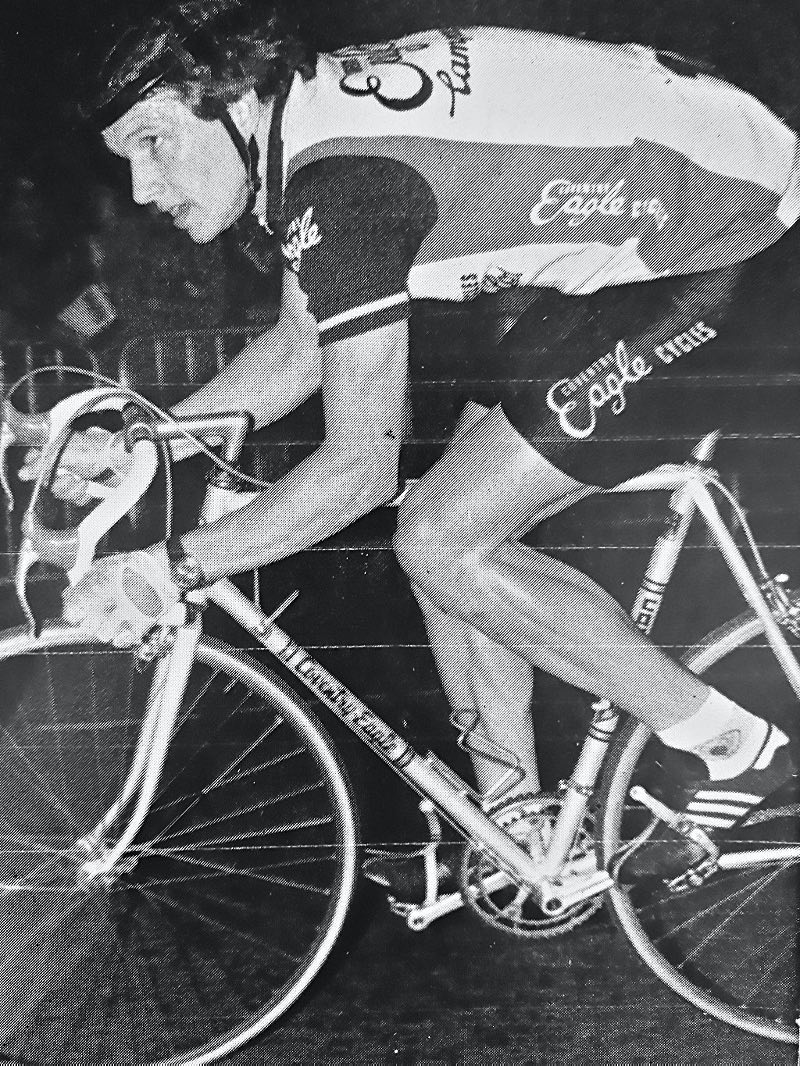
You rode the Bristol to Bradford, 402 kilometres, a long way for a four K guy.
“Yes but I was really an endurance rather than sprint rider, I have a medium twitch muscle physiology.”
Your last season was 1983?
“I rode the Etoile des Espoirs race in France in a composite team and then was going to have a bit of a holiday but was involved in a car accident in which my fiancée died – that was the end of my cycling career.”
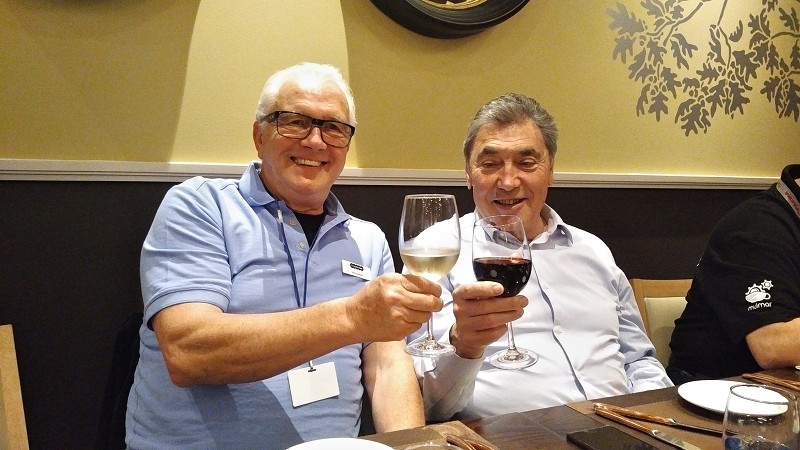
Hindsight?
“I’d have accepted the rainbow jerseys.
“And I’d have trained less. I think I was overtrained much of the time – I wish I’d had access to a heart rate monitor earlier in my career to enable me to know when to back off.
“But I met and raced against a lot of wonderful people – Jan Raas, the late Gerrie Knetemann in my Trico Noble days in The Netherlands – Allan Peiper, Phil Anderson…
“And many of the contacts I established carried over into my race organising career – I have no regrets.”
Scottish cycling ‘blogger,’ Owen Philipson asked me ‘which side of the fence’ I would be on regarding holding on to or letting slide that beautiful jersey?
As Mr. Charlton Heston once said; “when you pry it from my cold, dead hands…”



